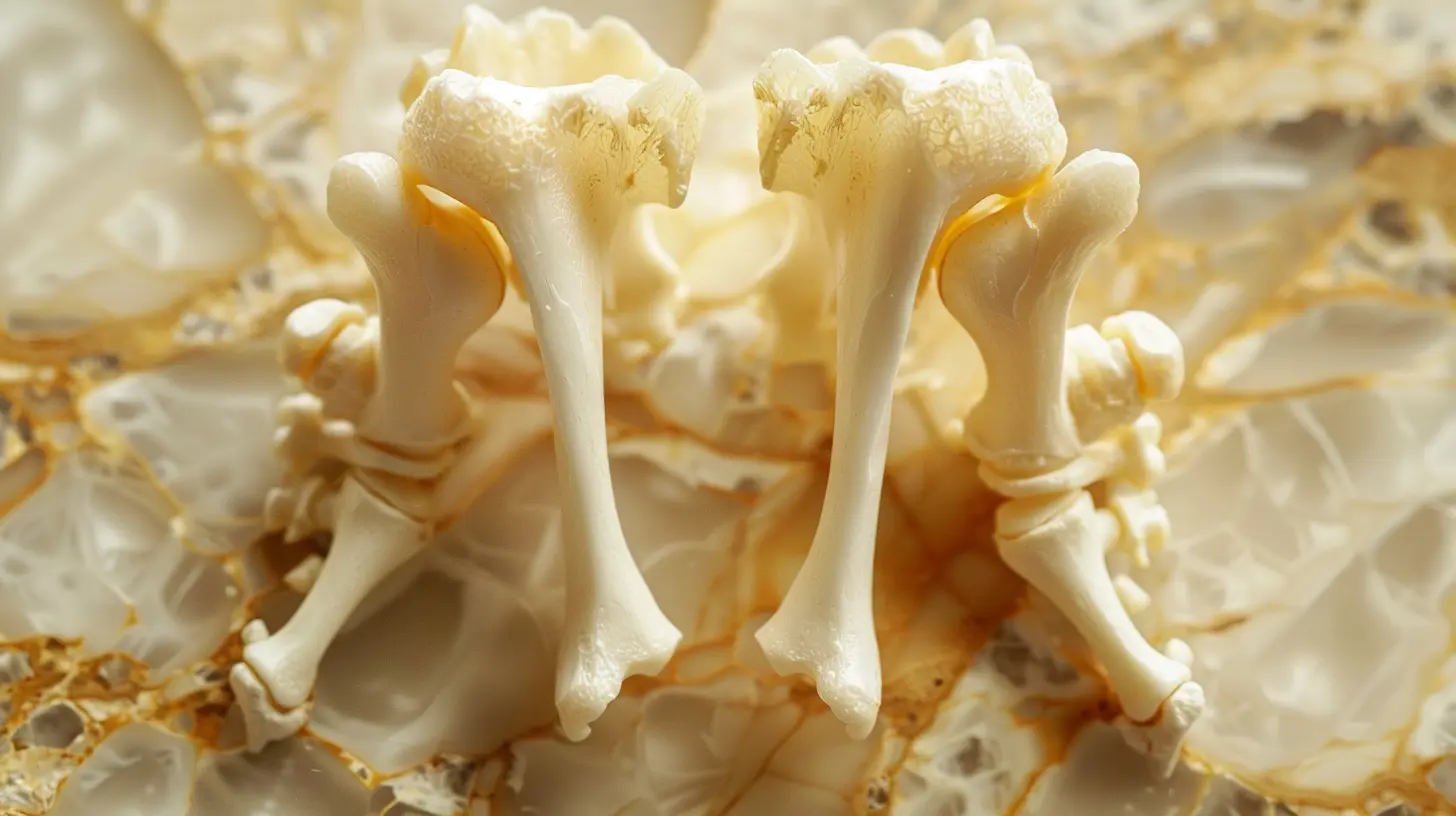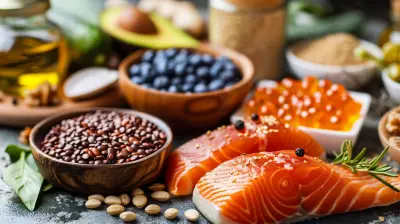Why Collagen Is Essential for Joint Health and How to Boost It
6 September 2025
Let’s face it—no one likes waking up with stiff knees, creaky hips, or that weird crunch in your shoulders. If your joints make more noise than your morning alarm, it's time to talk about collagen.
Collagen has become a bit of a buzzword lately. You've probably seen it in powders, beauty creams, and even protein bars. But beyond the hype, there's real science behind why collagen is so important—especially for your joint health.
In this article, we’ll break down exactly what collagen is, why your body craves it (especially as you age), and how you can give your body a leg up (pun intended) in producing more of it.
What Is Collagen, Really?
So first, let’s clear up the basics. Collagen is the most abundant protein in your body—it’s kind of like the “glue” that holds everything together. Think of it as the scaffolding or framework that supports your skin, bones, tendons, ligaments, and yes, your joints.Now, there are different types of collagen (scientists have identified 28 so far!), but Types I, II, and III do most of the heavy lifting when it comes to keeping your body strong and supple.
- Type I: Found in skin, bones, and tendons.
- Type II: Found mainly in cartilage—this is the big one for your joints.
- Type III: Found in connective tissue, organs, and arteries.
Now that we’ve got the boring science stuff out of the way, let’s talk about why your joints desperately need collagen.
Collagen and Joint Health: What’s the Connection?
Imagine your joints as shock absorbers in your car. Every time you walk, run, squat, or climb stairs, they take the hit. Cartilage (which is mostly made of collagen, especially Type II) is the cushion between your bones that keeps everything running smoothly and pain-free.But here’s the kicker—your body’s ability to produce collagen naturally starts to decline after your mid-20s. Yep, pretty unfair. By the time you hit your 40s or 50s, your collagen levels may have dropped significantly, which often leads to joint pain, stiffness, and even conditions like osteoarthritis.
The Role of Collagen in Cartilage
Cartilage is like the rubber padding between your bones in a joint. It's supposed to be smooth and springy. Healthy collagen levels keep cartilage strong and elastic. When collagen breaks down, that rubber padding wears thin—and bone starts grinding on bone.That’s when you get inflammation, pain, and limited movement. Ouch.
How Do You Know If You’re Low On Collagen?
Great question. It's not like your body sends you an alert when your collagen is running low. But your body does drop hints. Here are a few red flags:- Joint stiffness, especially in the morning
- Reduced flexibility or mobility
- Creaky knees or cracking joints
- Pain during or after physical activity
- Longer recovery time from exercise
- Wrinkles or sagging skin (yep, that’s a collagen clue too)
If any of these sound familiar, your collagen levels might be dipping—and your joints might be struggling because of it.
The Science-Backed Benefits of Collagen for Joints
You don’t just have to take someone’s word for it—there’s real research behind collagen supplementation and joint health. Clinical studies have shown that taking collagen (especially hydrolyzed collagen peptides) can:- Improve joint mobility
- Reduce joint pain, particularly in people with osteoarthritis
- Increase cartilage thickness and lubrication
- Enhance physical performance in athletes
One study published in the Journal of International Society of Sports Nutrition showed that athletes who took 10g of collagen peptides daily for 24 weeks experienced significantly less joint pain during activity.
Another study in older adults found that daily collagen supplementation improved knee function within just a few months. So yes, collagen isn’t just hype—it holds up in the lab and in real life.
Best Ways to Boost Collagen Naturally
If your joints are crying out for help, don’t panic. The good news is, your body can still produce collagen—you just have to give it the right ingredients and environment. Let’s talk about how.1. Eat Collagen-Rich Foods
Start with your plate. Bone broth is the OG collagen-rich food—it’s basically a simmered soup of bones and connective tissue that releases gelatin and amino acids.Other great collagen-boosting foods include:
- Chicken skin and cartilage (seriously!)
- Fish with the skin on
- Eggs (especially the yolk and membrane)
- Gelatin-based snacks (like real jello)
- Organ meats (liver, heart, etc.)
Not your thing? Don’t worry, we've got backup options.
2. Up Your Vitamin C Intake
Think of Vitamin C as the helper that pulls collagen molecules together. Without it, your body can’t synthesize collagen effectively.So load up on:
- Citrus fruits
- Bell peppers
- Strawberries
- Broccoli
- Kale
Tip: Try adding fresh lemon to your water—your joints will thank you.
3. Get Antioxidants In Your Diet
Free radicals (basically unstable molecules) break down collagen faster than you can say “ouch.” Antioxidants help fight that process.Foods full of antioxidants:
- Blueberries
- Green tea
- Dark chocolate (yes, please)
- Spinach
- Nuts and seeds
4. Collagen Supplements: Yay or Nay?
Here’s the deal: collagen supplements can be incredibly effective, especially as you age or if your diet is lacking. Some benefits of collagen peptides (the most absorbable form) include:- Easy digestion and fast absorption
- Proven efficacy in improving joint health
- Convenient dosing (usually in powder or capsule)
Look for products with:
- Hydrolyzed collagen (aka collagen peptides)
- Type II collagen (especially effective for joints)
- Added Vitamin C or hyaluronic acid for maximum synergy
Take it daily for at least 8–12 weeks to really start noticing benefits. And no, you won’t turn into the Hulk overnight—but your joints might start acting like they belong to someone 10 years younger.
Other Lifestyle Changes to Support Collagen and Joint Health
Keep Moving
Exercise—especially low-impact workouts like swimming, cycling, or yoga—helps stimulate collagen production and keeps joints lubricated.But go easy on the high-impact stuff if you’re already experiencing pain. Remember, the goal is to preserve joint function, not punish your knees.
Stay Hydrated
Water is essential for joint lubrication. Imagine trying to drive a car with no oil in the engine. That’s what your knees feel like when you’re dehydrated.Aim for at least 8 glasses a day—and more if you’re active.
Avoid Smoking and Excessive Alcohol
These are collagen killers. Smoking reduces blood flow to connective tissues, while alcohol depletes the nutrients your body needs to make collagen.Even if you love a good glass of wine, moderation is key for your joints' sake.
Collagen Myths You Should Stop Believing
Let's bust a few myths while we're here.❌ “All collagen is the same.”
Not at all. Different types (I, II, III) serve different functions. Choose the one that fits your needs—Type II is ideal for joints.
❌ “You get enough collagen from your diet alone.”
Maybe if you’re regularly sipping on bone broth and eating chicken cartilage. Most people aren’t—even the health nuts.
❌ “Collagen supplements work instantly.”
Sorry, it's not magic. Think of it like planting a seed. It takes time, consistency, and care.
When Should You Start Taking Collagen?
Honestly? Yesterday. But if you haven’t started yet, the best time is now.Whether you're an athlete, weekend warrior, office worker, or just someone who wants to age gracefully, collagen supports your joints through it all.
Even if you don’t feel joint pain today, preserving your cartilage now can prevent problems down the road. Think of it as preventative joint insurance.
Final Thoughts: Your Joints Deserve Better
We put our joints through a lot every day—walking, lifting, exercising, even just sitting for hours. Without healthy collagen levels, your joints get worn down faster than that favorite pair of sneakers.But the good news? You can absolutely take control. With the right foods, smart supplements, and healthy habits, you can keep your joints strong, flexible, and pain-free for years to come.
So go ahead—give your joints the support they deserve. Your future self will definitely thank you.
all images in this post were generated using AI tools
Category:
Healthy JointsAuthor:

Laurie Barlow
Discussion
rate this article
1 comments
Zachary Barlow
Great insights! Prioritizing collagen can truly enhance joint health. Small changes today can lead to significant benefits tomorrow!
September 28, 2025 at 3:33 PM

Laurie Barlow
Thank you! Absolutely, small changes can make a big difference in joint health over time. Glad you found the insights valuable!


